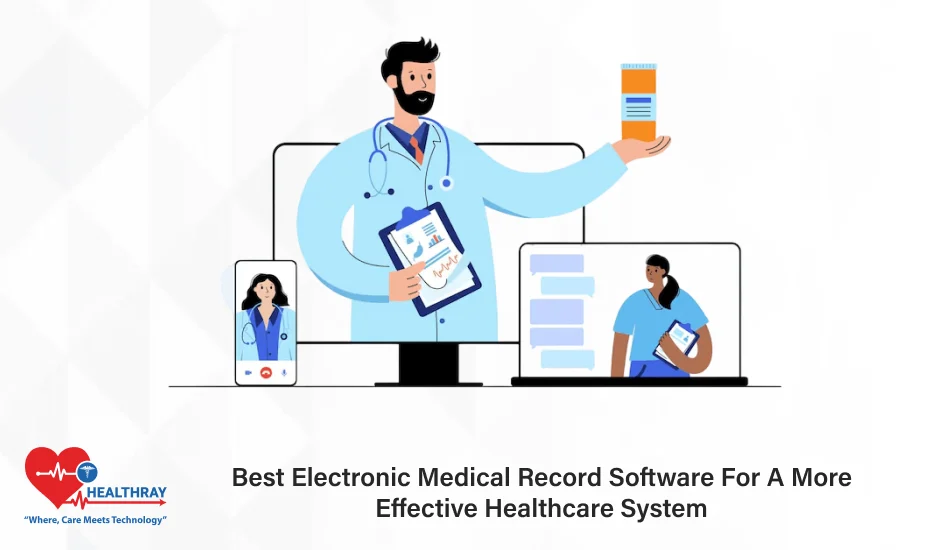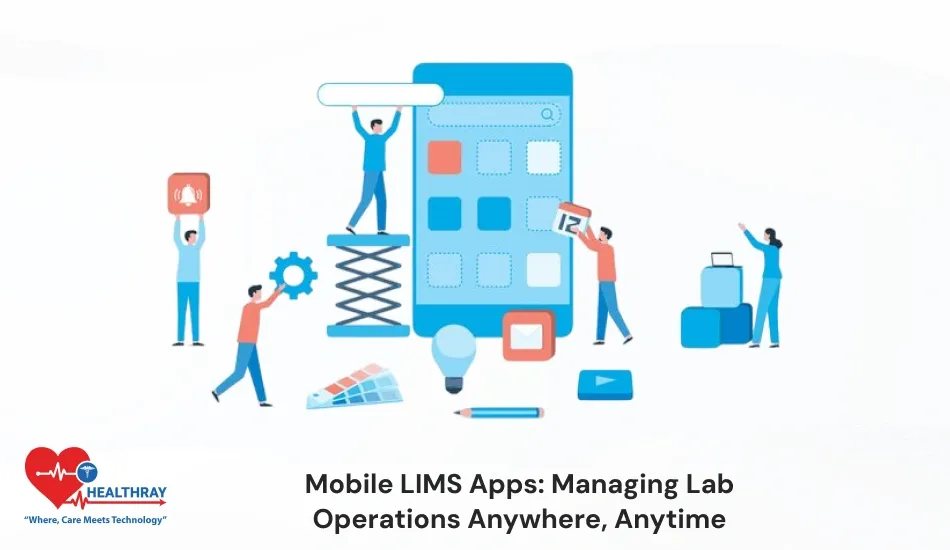Picking suitable electronic medical record (EMR) software has become a priority for many healthcare facilities today. The demand for efficiency, accurate documentation and better patient care is ever-increasing. Thus, the choice of an EMR today transcends just going paperless; it now entails picking a solution that will fit firmly into daily workflows while enabling the health provider to deliver high-quality care and ease the administrative burden.
Not all EMR software, however, has the same design and implementation measures. From user-friendliness to security to its pricing aspects, EMR system selection is fraught with considerations. In this guide, we shall look at some of the essential features of an EMR, review top contenders in the software market, and find ways to compare and contrast them. There will be an insight catered to your need and query, whether you are an administrator in the hospital, a healthcare provider, an IT manager, or simply a doctor.
Must-Have Features when Choosing EMR Software
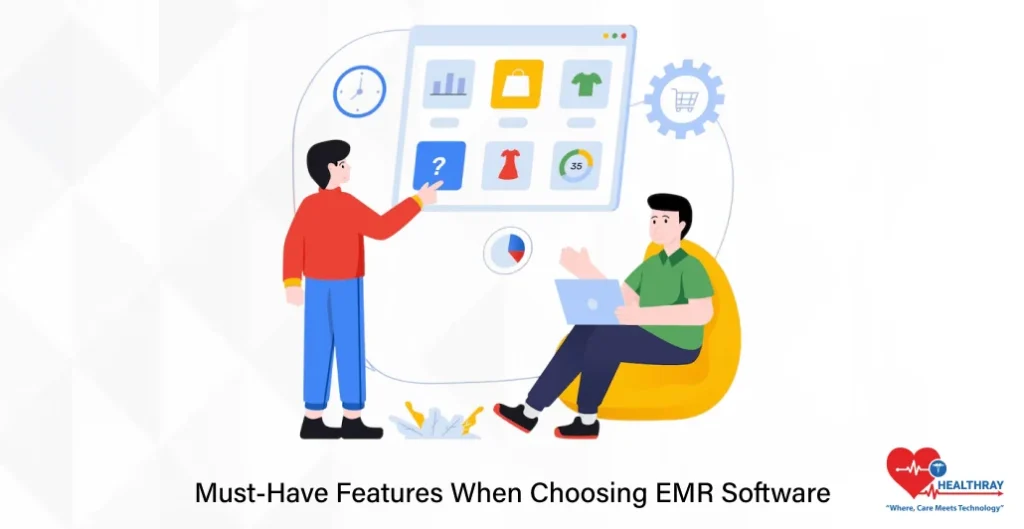
The Must-Have Features when Choosing EMR Software – Healthray
Choosing EMR Software involves knowing what features genuinely matter. While each healthcare facility might have some unique needs, certain features continuously prove to be of help to providers and administrators in operating with patient records in an orderly and secure manner. Here is a rundown on the main features you should be looking for:
Usability
Easy use is the feature most-important in any EMR software. The time-for healthcare professionals and staff-is to treat out complex interfaces with all the stress that accompany such an environment. An intuitive EMR system allowing key personnel easy access to patient data and updates would require very little training. The EMR should feature user-friendly dashboards, a non-complex approach for navigating with the system, and customizable options to facilitate staff in adapting the system to suit their workflows.
Integration Capabilities
An EMR does not work by itself; instead, it must collaborate closely with other systems used in the facility for billing, scheduling, patient management, and much more. Strong integration capabilities must allow data to flow freely between the systems, with minimal double entry and ensure that the relevant patient data are easily accessible. Interoperability with any external systems will also remain crucial to facilities having to exchange data with other providers.
Options for Customization
Most healthcare facilities are different in what they do. The qualities of customization allow EMR software to fit well into the specific workflows and needs of the organization. Examples include custom templates for specific documentation, personalized reporting tools, or adjustable user permissions. Customizable systems can reduce workflow disruptions, allowing teams to work more efficiently and focus on patient care.
Data Security and Compliance
Protection of patient data is sacrosanct in the healthcare sector, and EMR software is anchored against stringent HIPAA security standards in the United States. Look for features such as encryption, multi-factor authentication, and audit trails for tracking access to patient records. Strong security protocols minimize risks of data breaches and ensure that patient information remains private and secure.
Support and Training
No software implementation can be claimed to be successful without adequate support and training. An ideal EMR vendor would provide training sessions aimed at quickly familiarizing staff with the system, as well as on-going help in case of any technical issues. Other vendors provide resources like documentation and video tutorials, or a dedicated account manager, making it all the more easier for facilities to limitless assistance whenever needed.
Reporting and Analytics
Great EMR software should provide useful reporting and analytics functionalities to produce actionable insights out of raw data. They are useful for organizations to track key performance indicators, evaluate patient outcomes, and identify areas of improvement. Some EMR systems even harness predictive analytics to enable providers to anticipate patient needs and trends.
These features are the heart of an effective EMR system. A variant of such features can aid healthcare facilities in narrowing down their options to those that best help meet operational goals and ultimately support better patient care.
Best Electronic Medical Record Management System In 2026
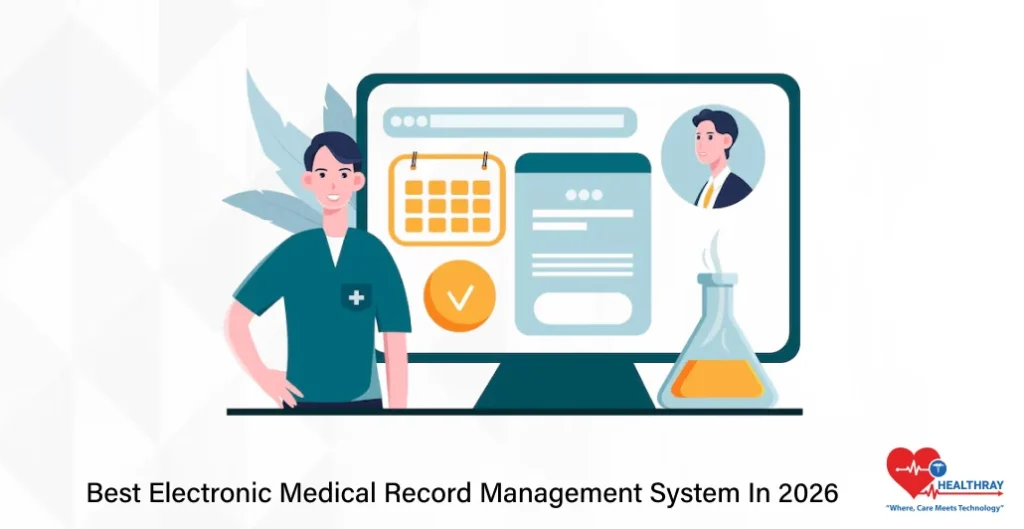
Electronic medical record systems have solutions on the market for different needs. Every EMR software solution has diversified features that cater to diverse healthcare settings. Here are some of the leading contenders for EMR software like Healthray Technologies, EMRSoftware.Ai, and Bigscal Technologies to help you identify what could potentially be fit for your facility.
Healthray Technologies
Healthray Technologies is a full-fledged EMR system that serves hospitals, clinics as well as individual practitioners. Because of the generally accepted research findings that show its strength in patient data security, Healthray is often praised for the user-friendly design of its software that accommodates seamless access to patient data across various environments. Patient records, appointment scheduling, billing integration, and reporting are all part of the package. Customized templates are also available in the platform and these could basically accommodate different workflows.
- Pros: Intuitive design, strong data security, flexible customizations.
- Cons: Limited third-party integrations.
EMRsoftware.ai
EMRSoftware AI brings artificial intelligence into EMR, giving predictive analytics that would help providers make proactive analysis and decisions. The system is ideal for healthcare facilities that want to upgrade their data-driven care of patients. EMRSoftware also has integration capability with some of the other software popular in healthcare space. Customized workflows for the patient scheduling, billing, and advanced reporting tools are just some of the features.
- Pros: AI-driven analytics, excellent integration options, customizable features.
- Cons: Slightly more steep learning curve to learn the AI-based features and the pricing is a little high.
Bigscal technologies
Bigscal Technologies provides scalable and sturdy EMR solutions that can be suited to small to medium-sized healthcare establishments. They ensure flexibility with their software as clinics and practices can even select what modules best suit their needs. Bigscal’s EMR comprises appointment scheduling, patient data management, and billing integration with options for multi-location support, making it a solid choice for growing practices.
- Pros: Modular structure, scalability, strong support options.
- Cons: Limited advanced analytics and reporting features.
Implementation and Support
A new EMR system can be complicated to implement and requires careful planning so that there is no disruption to daily activities. A unique process of support accompanies each software provider at the time of set-up, supplemented by tools for quick adaptation by the facility and its staff. Here’s a peek at the turn-on, training, and ongoing support provisions offered by each company:
Healthray Technologies
Healthray Technologies has a full-fledged support in terms of personalized onboarding for healthcare providers. They offer strongly hands-on training for the staff which is supplemented with continued resources like video tutorials, webinars, and comprehensive documentation. Direct client support would assist facilities in trouble-shooting and updates.
- Pros: Personalized onboarding, accessible resources, direct customer support.
- Cons: Limited options for advanced troubleshooting via self-service.
EMRSoftware.Ai
One of the most important features that EMRSoftware.Ai is known for is its advanced AI capabilities. The AI features are thoroughly explained through multiple training sessions that help users familiarize themselves with the specific workings of the technology. Initial set-up involves on-site support, plus an assigned account manager for the larger companies. Ongoing support would include webinars about the new features along with the knowledge base articles and video guides.
- Pros: In-depth learning of the AI functions, dedicated support manager, frequent update sessions.
- Cons: Training might take considerable time, especially for small practices.
Bigscal Technologies
Bigscal Technologies offers modular training according to the necessity of every health facility. Because their software is designed keeping maximum flexibility, a facility may opt to be trained only on those modules it uses, saving cost as well as time. They provide both online and phone supports and have a happy FAQ section for quick answers.
- Pros: Modular training options, time-efficient for small practices, affordable support packages.
- Cons: Limited learning platforms for complex setups on-site.
Key Takeaways About Implementation and Support
- Healthray Technologies provides a well-rounded support system that comprises hands-on onboarding and direct assistance.
- EMRSoftware now boasts a complete package in training for its advanced functionalities about its system, which is best suited for facilities ready to invest time into learning the AI tools of the system.
- Bigscal Technologies presents this modular support as that support whereby training would focus on a module/s, which is time-saver and cost-saver, in the way such training can be applied.
Understanding the level of support each provider offers will help healthcare facilities select a good EMR system that suits their training and support needs without creating disruption in operations.
Security compliance for data
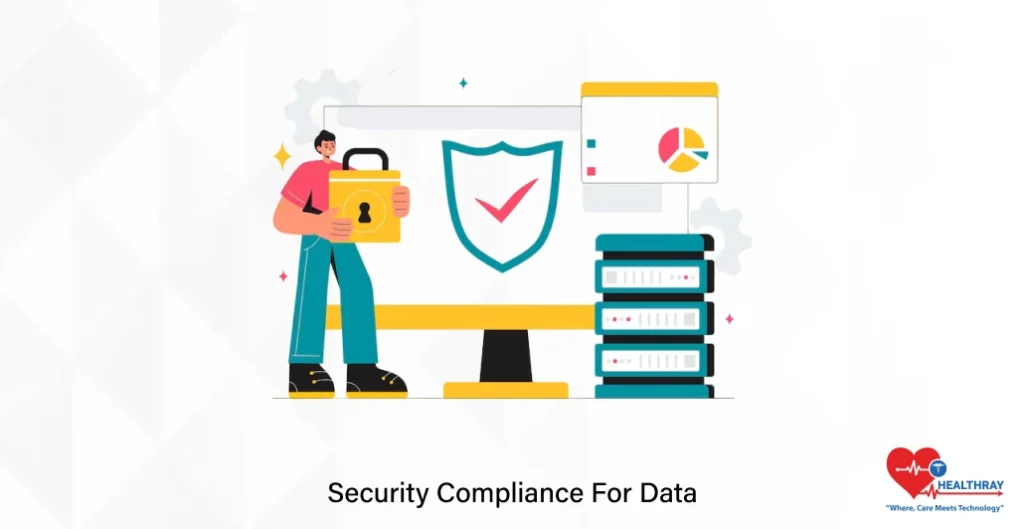
Safety for patient data is of utmost importance in healthcare, guaranteeing that EMR software is built to precise specifications in order to keep sensitive information guarded. Each EMR supplier has its individual approach to protecting compliance standards and knowing these may help the facilities pick on a system that matches their needs for the protection of their data.
Healthray Technologies
Healthray Technologies puts in place strong data security measures, such as stringent encryption methods and multi-factor authentication, to ensure that only authorized users access patient data. This software is fully compliant with the specified requirements of HIPAA, thus allowing for regular security audits. While doing so, Healthray Technologies monitors all accesses to patient data by way of an access log.
- Pros: Encryption, consistently HIPAA compliant, regular security audits.
- Cons: Extra costs incurred for advanced features of security protocols.
EMRSoftware.Ai
EMRSoftware.Ai has applied AI for data analysis and enhances security features. They have an AI-based monitoring system that detects and raises a flag for any suspicious activity, providing another level of protection for potential breaches. Their data management procedures are compliant with HIPAA and all other regulations offered.
- Pros: Monitoring based on AI for security; comprehensive compliance; advanced threat detection.
- Cons: Setup for configuring AI security may require additional time.
Bigscal Technologies
Bigscal Technologies is a fine system compliant with the requirements of HIPAA and adds a good level of security through data encryption, audit trails, and role-based access controls. This system serves small to medium practices, imparting dependable security without much extra power.
- Pros: HIPAA compliant audits, trails role-based access.
- Cons: Limited customizations for advanced security.
Key Takeaways Data Security and Compliance
- Healthray Technologies has a supportive force in encryption and regular auditing, customized solutions for facilities that prioritize vigorous data protection.
- EMRSoftware.Ai takes AI to actively watch for security threats, being a strong choice for facilities looking for cutting-edge, AI-driven protection.
- Bigscal Technologies provides elementary security features following the standards of HIPAA and is an ideal choice for low-to-moderate security requirements of smaller practices.
Given that data security and regulatory compliance are critical in healthcare, choosing an EMR provider with a focus on your facility’s unique security requirements is paramount.
Case Studies and Testimonials
Real time evaluations of EMR software through examples like these might give much-needed information about the performance of the systems in an actual healthcare environment. Nestled within this collection of case studies and testimonials from healthcare facilities that availed themselves of EMR technologies from Healthray Technologies, EMRSoftware.Ai, Bigscal Technologies, and other exemplary EMR systems.
Healthray Technologies
Case Study: A mid-sized health network adopted Healthray Technologies, with the aim of streamlining patient record management and relieving administrative burden. A report that arrived after six months indicated a 30 per cent improvement in record accuracy and reduced time for documentation. Staff members praised the easily usable interface of the system that allowed fast access to patient information without needing to undergo a steep learning curve.
Testimonial: “Healthray has simplified our workflow astoundingly. It is intuitive and trustworthy, assuring us in good stead of our organ-keeping patient records.” – Hospital Administrator
EMRSoftware.Ai
Case Study: EMRSoftware.Ai was used by an expert clinic to deploy AI-driven analytics and predictive insights. The clinic took advantage of the software’s analytics in tracking patterns within patient data, allowing them to modulate the treatment plans more effectively. They noticed a 20% improvement in patient outcomes within a year’s time as it related to managing chronic illnesses.
Testimonial: “AI features on EMRSoftware.Ai have indeed robustly shifted things for us. We now catch potential problems long before they come and change care plans as early.” — Clinic Director
Bigscal Technologies
Case Study: A small clinic acquired a modular EMR system from Bigscal Technologies in order to create a personalized record-keeping solution that would cater specifically to its own preferences without the inclusion of unnecessary features. They instantly realized better efficiency in administration, observing that training for the personnel would be faster thanks to Bigscal’s uncomplicated modules.
Testimonial: “Bigscal is perfect for a practice like ours. It’s flexible, easy to use, and doesn’t overcomplicate things.” – Practice Manager
Important Lessons from the Case Studies and the Testimonials
- Healthray Technologies: Touted for its intuitive design; ideal hospitals that need to improve record-keeping accuracy and streamline documentation say:
- EMRSoftware.Ai: Strong results in clinics aiming to transform patient outcomes, especially with chronic illness management, as a result of data analytics.
- Bigscal Technologies:Flexibility attributed to Bigscal Technologies makes it a suitable match for small practices needing affordable, uncomplicated, and easy-to-learn systems. Real-world experience demonstrates the actual benefits and limits of each EMR software.
Conclusion
Choosing the best electronic medical record software is learning about the specific requirements of your healthcare facility. With the right EMR software, patient care will be improved, administrative work made easier, and security guaranteed, but every software has unique advantages and disadvantages.
For the facilities focusing on ease of use and a seamless onboarding process, Healthray Technologies presents an intuitive design with robust customization options. EMRSoftware.Ai might be the most appropriate to AI-powered insights into patient care for advanced analytics. Bigscal Technologies offers modular, cost-effective solutions ideal for small-scale practices that do not require much functionality.
